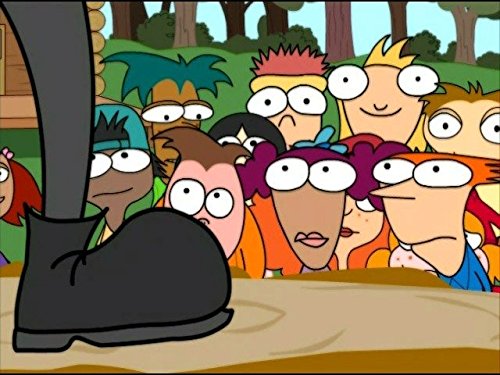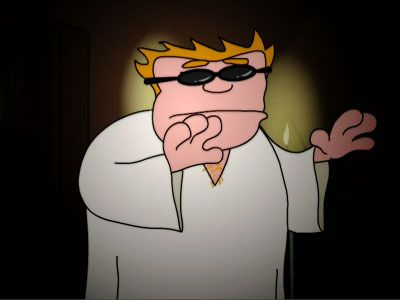Journal to the Center of McGuirk: Filmmaking and the Found Family of Home Movies, Part Four
I bought the fourth and final season of Home Movies during a trip across the state to register for college. I remember this particular moment more than the average DVD purchase because I hadn’t been able to watch these final episodes of my favorite show yet, and this was obviously important. During my senior year of high school, after my dad had left to start his new job, we sold the house we had bought just a year earlier, abandoning various home improvement projects and renting another house for my mom and I to live in until we could both move after graduation. We hadn’t bothered to transfer the satellite TV, and so I was without Home Movies until it hit DVD. When at last it did, it came as a safe space at a time when everything in my life was being thrown in the air.
The season begins with Brendon, Jason, and Melissa attending a performing arts camp, expecting to wow their peers and launch their careers. Instead, they find stuck-up instructors with unreasonable demands and closed minds. In an intersecting side plot, Coach McGuirk attends what he thinks is a “guys drinking beer in the woods” retreat that turns out to be an initiation into the Crywalkers, a group of men dedicated to getting in touch with their feelings. These twin themes of emotional honesty and unraveling dreams continue on an arc throughout the final episodes. Brendon’s attempts at directing a school play crash and burn, the kids fail to enter a local film fest, and their attentions are scattered for the first time by the realities of growing up. Meanwhile, Paula struggles to break up with a man she has no feelings for, and Brendon allows a project to spiral out of control for fear of admitting he’s lost interest in it and wishes he could spend more time being a regular kid instead of an auteur.
The show makes its subtext fully text in its penultimate episode, “Temporary Blindness”, in which a family tree project at school brings everyone’s anxieties to the surface. Melissa panics over her mother’s absence, Brendon struggles to make his family seem interesting, and Jason constructs an elaborate lineage for his pet ferret. The three of them help each other out, realizing the fictions they write together are more entertaining (and comforting) than the truth. McGuirk moves in with the Smalls due to temporary blindness caused by laser eye surgery, and lies about his recovery so he can continue running a “blind psychic” scam out of their living room. In a small but noteworthy moment, it finally comes up that Brendon’s baby sister, Josie, was adopted sometime after the departure of his father, who continues to go completely unmentioned throughout the final season.
In the series finale, “Focus Grill”, the kids discover a tape of their unfinished first movie, and decide to create an ending for it. Unable to agree on a conclusion, they each write one and test it with a focus group of their classmates. Jason shoots a surrealist gross-out “throw-up monster” attack, Melissa imagines her character’s mother calling for her to claim her throne as a princess, and Brendon drafts an ending in which the three heroes take residence in a house of trash. It’s unclear if he even realizes the significance of his own monologue about taking shelter within “things that were not intended to go together”, but as their first (and last) film ends with Brendon, Jason, and Melissa declaring that they are “strong together”, we see what the show has been building to since the pilot—they are family, and they never have to really say so for it to be true. Meanwhile, McGuirk offers to build Paula a grill, and quietly moves into a tent in the yard when the project takes longer than anticipated. The faulty grill explodes, and McGuirk takes everyone out to dinner. Brendon accidentally drops his camera out the car window, and it shatters. He nearly says something about it, but after looking around at the family-shaped unit of people he cares about discussing what to eat, decides not to. The series ends here, with the suggestion that maybe Brendon doesn’t need to make movies anymore.
That summer before college, I too attended a performing arts camp, enrolled in a week-long cartooning course. A call home revealed that my mom had changed the answering machine message to remove my dad’s name. He hadn’t been living with us for months, but something about his absence from the family roster caught me off guard. I confided in the friends I had made at camp, friends I would remain close to into the future, and realized that everything happening felt inevitable and correct. I was leaving home and proving I could make new connections in the real world. My parents, a couple in name only for most of my life, began to get along better as friends than they ever had during their marriage. I joined some of my high school friends in college, became friends with their friends, and started pursuing my passions in earnest. I realized nothing could prevent me from staying close to the people who were important to me. Families form while you’re not paying attention, and one day you realize that one way or another, the people you need are the ones who stay in your orbit. I look back now and realize that Home Movies taught me to pay attention to the connections that matter, even if they don’t announce themselves. I write about movies, I have a network of friends I care about, and I’m married to someone wonderful who happens to be content to marathon an entire season of Home Movies with me in a day. We are family, and we are strong together.







